In the pandemic, adoption of tablets like iPads in eldercare is speeding up, helping adult day care go virtual, enabling assisted living communities and nursing homes keep people connected and engaged, and making it possible for doctors to see their patients virtually.
Tablets aren’t new in the scope of dementia care; long-distance caregivers may use them to help establish communication channels with loved ones in assisted living facilities. They can also be used to help measure and monitor vitals and or to connect doctors and patients remotely.
Some of this assistive technology has its drawbacks — cost, complexity for the user, privacy concerns — but when it comes to engagement, communication and staying connected during the pandemic, the value of iPad-like devices is clearer than ever.
Nursing Homes and Assisted Living Get on Board with iPads
As coronavirus has made it so residents of long-term care facilities throughout the country aren’t able to visit with their loved ones, and their social interactions within their care communities are restricted, assisted living facilities and nursing homes are adopting virtual technology to help fill the gaps.
From Maine to Minnesota to South Carolina, organizations and private individuals who recognize their positive impact are fundraising for or distributing iPads at nursing homes. In Elk Point, South Dakota, the local school district stepped up, donating their iPads which were not in use during the shutdown. In Florida, the Alzheimer’s Association and the Florida Department of Elder Affairs is distributing 300 tablets to nursing homes and assisted living facilities, partnering technology provider iN2L.
“They don’t get to sit down and have meals together … they don’t get to have movie night right now. They’re not getting to congregate in their facilities at all,” said Michelle Branham, vice president of Public Policy at the Alzheimer’s Association in Florida.
The iN2L tablets being dispersed at Florida nursing homes have one-touch video chat tools and more than 1,000 interactive games, movies and audiobooks. Older adults who are sharing the tablets can create their personal profiles with saved personal contacts, photos and videos. The tablets also enable tele-health, allowing visitors to visit their doctors virtually during the pandemic.
Scientists have found that using various apps on iPads may also serve to reduce agitation for those with dementia. Even those with severe impairment may also use simple apps on the tablets under supervision — especially apps that are matched to people’s preferences and cognitive function.
Adult Day Care Centers Take Their Programming Online
While some adult day care centers have been forced to close their doors (at least for now), others are shifting their programs to digital. That’s how Fred Anderson’s mother, who is 83 with dementia, still keeps up with her adult day care program’s social and physical activities — albeit virtually.
Live Oak Adult Day Services, which operates four adult day care centers in California, launched virtual activities for participants during the shutdown. Five days a week, Anderson’s mom plays word games and listens to live musical performances through Live Oak’s virtual program.
“My mom really looks forward to that,” said Anderson in an interview with Being Patient. “She gets to have some time with people her age … It gives us an hour to 90 minutes where my mom is absolutely entertained. We know she’s in great hands.”





